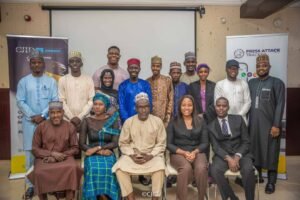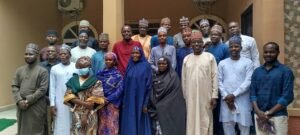
Yobe rolls out capacity building for health managers on national health sector renewal initiative
By Baba Dan’iya
Yobe State has commenced a four-day capacity development workshop aimed at strengthening leadership, health system strengthening, and health planning, as part of the new National Health Sector Renewal Initiative.
The training, which began on Monday in Damaturu, is a cascaded programme targeting programme officers and managers directly involved in implementing health interventions at state, local government, and community levels.
Mr Babagana Abba, the Sector Wide Approach (SWAp) Desk Officer at the Yobe Ministry of Health, highlighted the significance of the training.
According to Abba, this initiative is a crucial reform by the Federal Government, emphasising a sector-wide approach to prioritise health sector interventions at both national and sub-national levels.
He explained that the training aims to equip health managers with the necessary skills to effectively utilise the National Health Sector Renewal Initiative document, which serves as a “living document” for implementing programmes across various health entities, from the State Ministry of Health to facilities and regulatory agencies.
“This training is now being cascaded to the health managers, not directors or deputy directors, but the programme officers and programme managers – those that are directly having the programme under their custody,” Abba stated.
He emphasised that this direct engagement with frontline implementers addresses challenges faced in previous trainings, where higher-level officials found it difficult to translate the document’s contents to lower cadres.
He further explained that approximately 150 health managers from states, the FCT, and some Ministries, Departments, and Agencies (MDAs) of the Federal Ministry of Health and its agencies were trained at the national level in Abuja last week.
The current workshop in Yobe is part of the cascading effort, with other states also conducting similar trainings.
Abba urged the participants, numbering over 70, to be attentive and interactive, stressing that the knowledge gained would be crucial for developing the 2026 Annual Operational Plan.
“Everybody is being carried along, everybody is inclusive, everybody is being informed of what the new document and what the National Health is talking about,” he added.
Speaking virtually at the workshop, the Coordinating Minister for Health, Prof. Muhammad Pate, represented by Dr Isa Bukar, the Technical Advisor to the Minister, underscored the urgency of the initiative as Nigeria approaches the 2026 annual operational plan timelines.
“We cannot afford to be doing the same things over and over again,” Dr Bukar stated, emphasising that 2026 would be the first full year to implement laudable projects such as the World Bank-supported ‘RESHEPP’ project and the Basic Healthcare Provision Fund.
He acknowledged that while reforms take time, there is a need to demonstrate the fidelity of these new approaches in 2026 to transform the Nigerian health system.
Dr Bukar highlighted that despite the impending 2027 general elections, which might shift political focus, technical experts within the Nigerian health space must continue to develop and provide essential healthcare delivery.
He recalled the collaborative efforts in 2025 where leaders from states, the federal government, and development partners worked together to harmonise the 2025 annual operational plan across the 36 states and the FCT, marking a historical first for the country.
He stressed the need to consolidate on these gains for the 2026 Annual Operational Plan, which will be themed around developing a “rational, realistic, pragmatic, and comprehensive” plan that aligns with health budgets.
Dr Bukar acknowledged challenges such as technical capacity gaps in some states and the fragmentation of plans across agencies, reiterating the commitment to bridging these gaps through technical assistance.
He reiterated that achieving a revamped and robust annual operational plan is a gradual process requiring renewed political will and leadership from all actors.
The workshop aims to strengthen institutional capacity at the frontline, improve performance dialogue sessions, and enable states to develop timely, quality, and comprehensive plans.
This includes strengthening analytical capacity, understanding of health systems, problem-solving, and the use of data for decision-making.
Dr Musa Matazu, representing the Gates and Aliko Dangote Foundations, lauded the training as unprecedented in its strategic focus on health systems strengthening, problem-solving, and result-oriented planning.
He emphasised that given limited resources, proper planning linked with data is crucial for developing impactful, result-oriented plans.
“A lot of people do not understand what our health system is,” Dr Matazu noted, adding that it encompasses leadership and governance, human resources, commodities, demand generation, data, monitoring and evaluation, and supportive supervision.
He commended Yobe State for already demonstrating elements of health system strengthening and the SWAp approach through strong collaboration among partners, resource mobilisation, and pooling.


